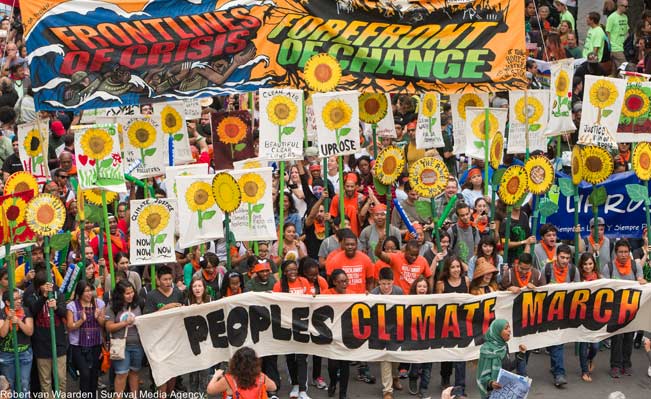 More than 300,000 march in solidarity for Climate accountability, at the People's Climate March on September 21, 2014. Photo: Robert van Waarden
More than 300,000 march in solidarity for Climate accountability, at the People's Climate March on September 21, 2014. Photo: Robert van Waarden
A turning point in human history? Elaine Graham-Leigh takes a closer and more critical look at what the Paris talks really mean for our planet
The outcome of the Paris climate talks shows that world leaders have learnt one lesson from the debacle of the Copenhagen talks six years ago. The failure then to reach a deal demonstrated the difficulty in reducing emissions for governments committed to profits and market mechanisms, not to mention the strength of fossil fuel vested interests, but the criticism they got for it clearly left its mark. This time, faced with the same obstacles to emissions cuts, they’ve gone for option B: proclaim an ambitious target for limiting global warming and hope no one notices the lack of concrete proposals for how you will achieve it.
That we now have an agreement that global warming should be kept to 1.5oC is testament to sustained campaigning worldwide for real action on climate change. We helped create an atmosphere in which our leaders could not face us if they came out of the Paris talks without a deal. What this is not, however, is that real action on climate change.
The deal itself recognises that the various countries’ proposals for actual reductions in emissions are far from sufficient to achieve the headline goal, putting us on course in fact for around 3oC of warming. That gap will apparently be bridged by a review in 2018 and a ‘stock take’ in 2023, provisions notable for their vagueness and for the fact that they’re not going to be legally binding.
Where the specifics of how we might keep warming to below the agreed threshold are discussed, the deal looks to the creation of carbon markets, which as we know from past experience have proved ineffective to reduce emissions and simply allow those who can afford it to pay to pollute. If the current falls in oil prices are a long term trend, as analysts have suggested, this will also make using market mechanisms to shift away from oil towards renewable energy even less viable.
Mainstream media reports of the Paris talks largely seem to be toeing the line put forward by the leaders themselves, that this is a historic victory. The Guardian, for example, is calling the deal ‘the world’s greatest diplomatic success’ Some NGOs have followed suit, with Avaaz, which during the talks was praising the ‘ambitious’ US and EU negotiators, telling its supporters on Sunday that this was ‘a turning point in human history…[which] gives us the platform we need to realize the dream of a safe future for generations’ and comparing it to the ending of apartheid. Others, however, are more critical. As Nick Dearden, Director of Global Justice Now commented, “without an equitable means of achieving [1.5oC], this deal will be unjust and unenforceable … An unsustainable ‘free market’ model is being locked into place which will exacerbate inequality, poverty and climate destruction.”
In the UK, we are facing a government apparently at war with renewables, clinging to an austerity agenda which can find money for bombing Syria but not for a creating green infrastructure. That the Paris talks did produce a deal shows us that our movement can make a difference, that marching on climate is not pointless trooping from A to B but does put pressure where it counts. That the deal we have is little more than smoke and mirrors shows how much more marching and protesting we will have to do. Clearly, one result of the Paris talks is supposed to be that we all conclude that climate change is sorted and we can now all stay at home. The real success for the climate will be if we in the global green movement can use this as a springboard to build even bigger and louder campaigns in the months to come.

